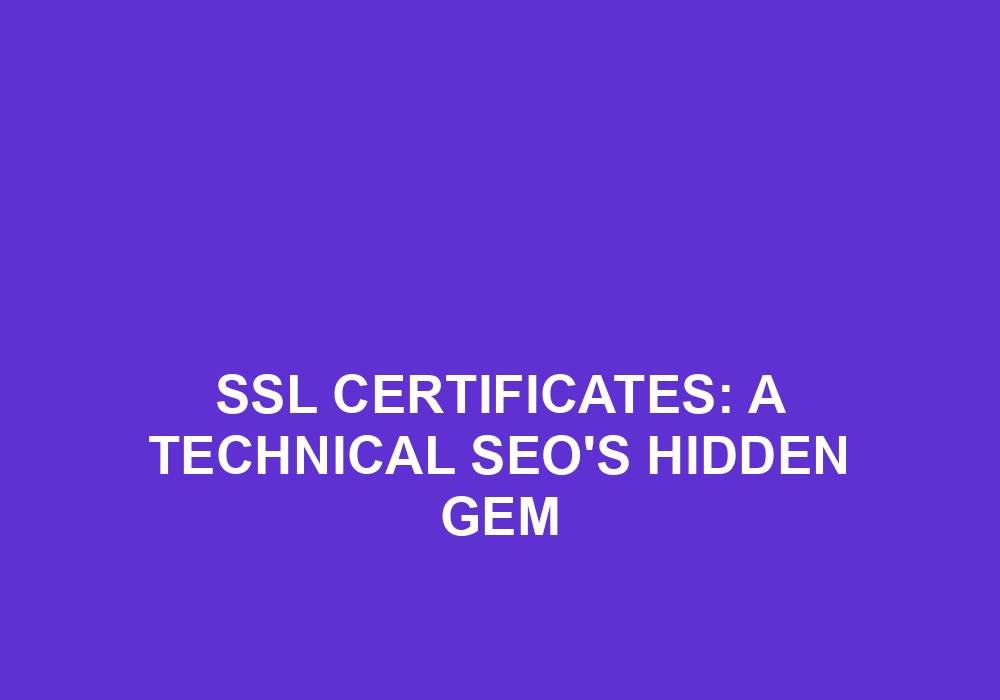Imagine having a secret weapon that could boost your website’s search engine rankings while keeping it secure. Well, look no further because SSL Certificates are here to save the day! In this article, we will uncover the hidden gem of SSL Certificates and how they can supercharge your website’s SEO efforts.
Did you know that SSL Certificates not only encrypt sensitive information but also play a crucial role in enhancing your website’s visibility on search engines like Google? It’s true! Incorporating SSL Certificates into your website not only protects your users’ data but also signals to search engines that your website is trustworthy.
You might be wondering, what exactly is an SSL Certificate? Well, think of it as a digital passport that verifies the authenticity of your website and ensures secure communication between your site and your visitors’ browsers. With cyber threats on the rise, having an SSL Certificate has become vital for any website, big or small.
So, stay tuned as we delve into the world of SSL Certificates, unraveling their significance in the world of SEO and how they can help you elevate your website to new heights. Get ready to unlock the power of SSL Certificates and take your website’s SEO game to the next level!
SSL Certificates: A Technical SEO’s Hidden Gem
SSL certificates are an essential component of website security and have become increasingly important for technical SEO professionals. In this article, we will explore the world of SSL certificates and uncover why they are considered a hidden gem in the realm of technical SEO. From the basics of SSL certificates to their impact on search rankings and user experience, we will delve into the intricate details of this crucial tool. So, let’s dive in and discover why SSL certificates are a game-changer for technical SEO.
The Basics of SSL Certificates
Before we explore the technicalities of SSL certificates, it’s important to understand what they are and how they function. SSL stands for Secure Sockets Layer, a technology that establishes an encrypted connection between a web server and a user’s browser. This encryption ensures that any data exchanged between the two remains confidential and protected from potential hackers or malicious entities.
An SSL certificate acts as a digital passport for a website, authenticating its identity and enabling secure communication with users. When a website has an SSL certificate installed, it can be accessed via “https://” instead of the standard “http://”. The presence of the “s” indicates that the website is secure and offers encrypted connections.
SSL certificates are issued by trusted Certificate Authorities (CAs) and come in different types, including Domain Validation (DV), Organization Validation (OV), and Extended Validation (EV). The level of validation determines the amount of information required to obtain the certificate and the level of trust it instills in visitors. Now that we have the basics covered, let’s explore the benefits of SSL certificates for technical SEO.
The Impact on Search Rankings
One of the reasons SSL certificates are a hidden gem in the world of SEO is their impact on search engine rankings. Back in 2014, Google announced that HTTPS would be used as a ranking signal, giving secure websites a slight boost in search results. Over the years, this signal has gained more prominence, and today, SSL certificates have become a critical factor for SEO success.
Search engines prioritize user safety and aim to deliver secure and trustworthy websites in their search results. By implementing an SSL certificate and moving from HTTP to HTTPS, websites signal their commitment to user security and data protection. This, in turn, enhances their credibility and trustworthiness in the eyes of search engines, leading to improved search rankings.
Furthermore, SSL certificates contribute to a positive user experience, which is another crucial ranking factor. Secure websites load faster, provide a secure environment for transactions and user interactions, and reduce the risk of data breaches. These factors enhance user engagement and satisfaction, leading to longer site visits, lower bounce rates, and ultimately, improved search rankings.
The Benefits of SSL Certificates for Website Security
While the impact on search rankings is significant, the primary purpose of SSL certificates is to enhance website security. With the increasing prevalence of cyber threats, website owners need to prioritize the protection of their visitors’ sensitive information. SSL certificates play a vital role in achieving this goal by encrypting data and preventing unauthorized access.
When users visit a secure website, their browser verifies the SSL certificate, ensuring it is valid and properly installed. This process establishes a secure connection and encrypts any information exchanged between the user and the website. So, even if a hacker manages to intercept the data, they won’t be able to decipher it. This encryption is particularly crucial for websites that handle sensitive data, such as login credentials, payment details, and personal information.
Moreover, SSL certificates protect websites from man-in-the-middle attacks, where an attacker intercepts communication between a user and a website to eavesdrop, tamper with the data, or inject malicious content. With SSL certificates, these attacks are virtually impossible as the encrypted connection ensures the integrity and confidentiality of the transmitted data.
Ensuring Compatibility and Trustworthiness
In addition to the security and SEO benefits, SSL certificates also ensure compatibility and trustworthiness across different devices and browsers. With the proliferation of mobile devices, websites must be accessible and properly displayed on various screens. However, some browsers may display security warnings for websites without an SSL certificate, discouraging visitors and tarnishing their perception of the site.
By incorporating an SSL certificate, websites ensure that they are compatible with all browsers and devices without triggering any security warnings. This instills trust in visitors and encourages them to engage with the site, leading to higher conversion rates and customer satisfaction.
Now that we understand the impact and benefits of SSL certificates, let’s explore some practical tips and best practices for utilizing this hidden gem to its full potential.
Practical Tips for Utilizing SSL Certificates
Now that we understand the significance of SSL certificates for technical SEO, it’s time to explore some practical tips for implementing and optimizing their usage. By following these tips, you can maximize the benefits of SSL certificates and strengthen the security and search rankings of your website.
1. Choose the Right Type of SSL Certificate
When selecting an SSL certificate, it’s essential to pick the right type based on your website’s needs. Consider the level of validation required, the type of information you handle, and the level of trust you want to instill in your visitors. For websites that handle sensitive data or engage in e-commerce, an Extended Validation (EV) certificate is recommended for its highest level of validation.
On the other hand, simpler websites that do not handle sensitive information can opt for Domain Validation (DV) certificates, as they provide the necessary encryption without extensive validation processes. Determine your requirements and select the SSL certificate that aligns with your website’s needs and goals.
Benefits:
- Enhanced security and trustworthiness
- Proper validation and authentication
- Flexibility based on website requirements
2. Implement a 301 Redirect
After installing an SSL certificate, it’s crucial to redirect all HTTP URLs to their corresponding HTTPS versions. This can be done by implementing a 301 redirect, which informs search engines and users that the page has permanently moved to a new location. Without proper redirection, search engines may treat the HTTP and HTTPS versions as separate pages, leading to duplicate content issues and potentially diluting the SEO impact of the SSL certificate.
By implementing a 301 redirect, you ensure that all traffic is directed to the secure version of your website, consolidating the SEO value and avoiding any confusion or duplicate content penalties.
Benefits:
- Consolidation of SEO value
- Avoidance of duplicate content issues
- Improved user experience
3. Monitor and Update SSL Certificates
SSL certificates have an expiration date, usually ranging from a few months to a couple of years. It’s crucial to monitor and update your SSL certificates before they expire to ensure uninterrupted security and user trust. Failure to renew SSL certificates can result in security warnings, potential loss of search rankings, and a negative impact on user experience.
Implement a system to monitor SSL certificate expiration dates and ensure timely renewal. This proactive approach will ensure the continuity of your website’s security and search rankings.
Benefits:
- Continuous website security
- Avoidance of security warnings and penalties
- Maintained search rankings and user trust
The Future of SSL Certificates
As the importance of website security and user privacy continues to grow, SSL certificates are expected to play an even more significant role in the future of the internet. With advancements such as HTTP/3, which requires HTTPS to function, SSL certificates will become a standard rather than an optional feature.
Additionally, the rise of mobile devices and the increasing reliance on online transactions and interactions will further emphasize the need for SSL certificates. Websites that neglect to implement proper security measures, including SSL certificates, may face penalties in search rankings and lose the trust of their users.
Therefore, it is crucial for technical SEO professionals to stay updated with the latest trends and best practices in SSL certificate implementation and optimization. By harnessing the power of SSL certificates, they can ensure the success, security, and longevity of their websites in the ever-evolving digital landscape.
In summary, SSL certificates are indeed a hidden gem for technical SEO professionals. Not only do they enhance website security and protect user data, but they also contribute to improved search rankings and user experience. By choosing the right type of certificate, implementing proper redirects, and staying vigilant about certificate updates, technical SEO professionals can unlock the true potential of SSL certificates and reap the benefits they offer. So, don’t overlook this valuable tool in your technical SEO strategy and start harnessing the power of SSL certificates today.
Key Takeaways: SSL Certificates – A Technical SEO’s Hidden Gem
- An SSL certificate is a crucial tool for improving website security and boosting technical SEO.
- SSL certificates encrypt data transmitted between a website and its visitors, ensuring privacy and trust.
- Implementing an SSL certificate helps improve website rankings on search engine result pages (SERPs).
- A website with an SSL certificate is more likely to be favored by search engines, leading to higher visibility.
- SSL certificates also enhance user experience, as visitors perceive secure websites as more reliable.
Frequently Asked Questions
SSL certificates play a crucial role in improving a website’s security and SEO performance. Here are some frequently asked questions about SSL certificates for technical SEO.
1. Why are SSL certificates important for SEO?
SSL certificates are essential for SEO because they secure the connection between a user’s browser and a website. When a website has an SSL certificate, it displays a padlock icon and uses the “https://” protocol. These visual indicators instill trust in users and search engines, leading to higher rankings in search results. Additionally, search engines consider SSL certificates as a ranking signal, giving secure websites a competitive advantage.
By implementing SSL certificates, website owners can protect sensitive data from being intercepted by hackers. This not only safeguards user information but also prevents malicious activities like data theft and unauthorized access, which can have serious consequences for SEO and user trust.
2. How does an SSL certificate impact website loading speed?
An SSL certificate might have a minor impact on website loading speed due to the encryption and decryption process. However, the benefits of SSL certificates outweigh this slight decrease in loading speed. In fact, Google has stated that the SEO benefits of SSL certificates outweigh the small impact on performance.
To mitigate any significant impact on loading speed, it is important to choose a reputable SSL certificate provider and optimize the SSL implementation. This includes enabling HTTP/2 protocol, utilizing modern encryption algorithms, and setting up proper caching techniques. These steps can help minimize the impact on website performance and ensure a smooth user experience.
3. Can SSL certificates prevent website hacking?
While SSL certificates are not a foolproof solution against website hacking, they significantly reduce the risk. SSL certificates encrypt the data transmitted between a user’s browser and a website, making it extremely difficult for hackers to intercept and decipher the information. This encryption prevents attacks like man-in-the-middle attacks, where attackers eavesdrop on the communication between the user and the website.
However, it is important to note that SSL certificates primarily protect data during transmission and do not guarantee website security in all aspects. It is crucial to implement other security measures, such as regular security audits, strong passwords, and timely software updates, to ensure comprehensive website security.
4. Can I switch to HTTPS without affecting my SEO rankings?
Switching from HTTP to HTTPS can potentially impact SEO rankings if not done correctly. It is crucial to follow best practices to maintain SEO performance during the migration process.
To safely switch to HTTPS without affecting SEO rankings, it is important to use 301 redirects to redirect all HTTP URLs to their HTTPS counterparts. Additionally, update internal links, sitemaps, and canonical tags to reflect the new HTTPS URLs. Inform search engines about the migration through the Google Search Console and monitor for any issues or errors that may arise during the transition.
5. Do all types of websites need SSL certificates?
Yes, all types of websites can benefit from SSL certificates. Whether it’s an e-commerce website that handles online transactions or a simple blog that collects user information, SSL certificates enhance security and user trust.
Furthermore, search engines are taking website security very seriously, and not having an SSL certificate can adversely affect your website’s ranking. With the emphasis on user privacy and secure browsing experiences, it is essential to prioritize the implementation of SSL certificates on all types of websites.
Summary
SSL certificates are like secret passes that help websites stay safe and earn the trust of visitors. These digital certificates make sure that the data sent between a website and a visitor’s computer is secure and private.
By getting an SSL certificate, websites can protect sensitive information, boost their search engine rankings, and make visitors feel more comfortable sharing their personal details. This hidden gem of technical SEO is an important tool for website owners to ensure a secure and trustworthy online experience.
In conclusion, SSL certificates are not just for tech geeks – they’re an essential tool for anyone running a website. So, if you want your website to be safe, trusted, and visible to search engines, consider investing in an SSL certificate. Your visitors will appreciate it, and you’ll have peace of mind knowing that your website is protected.





